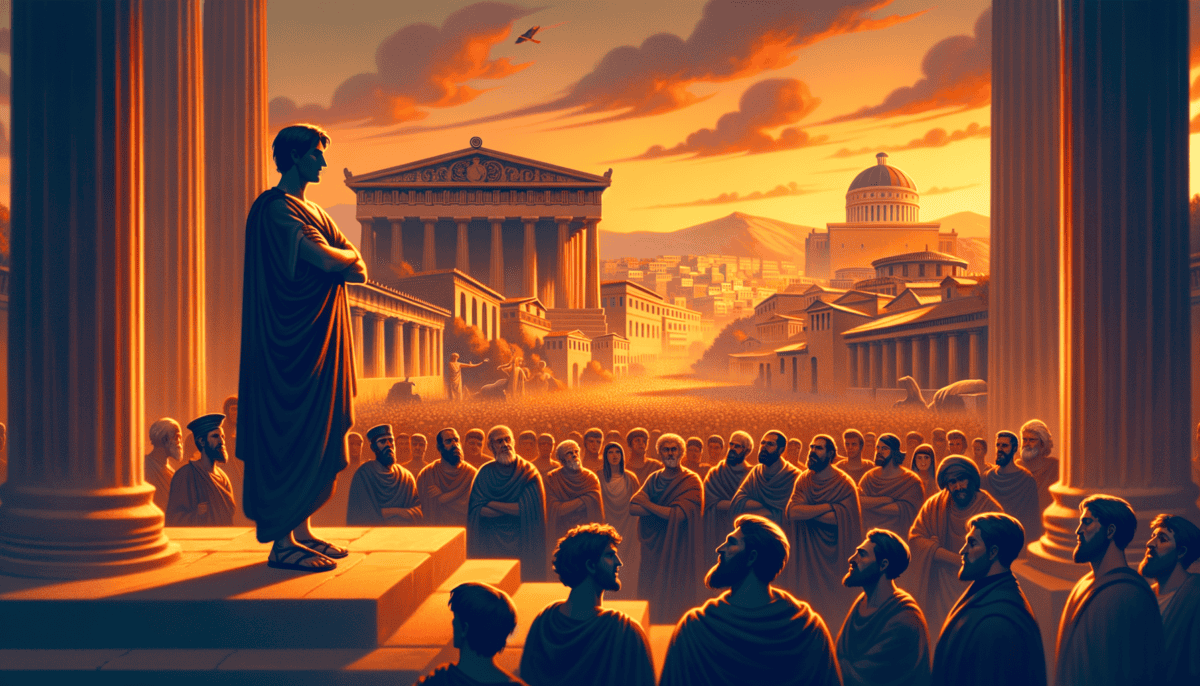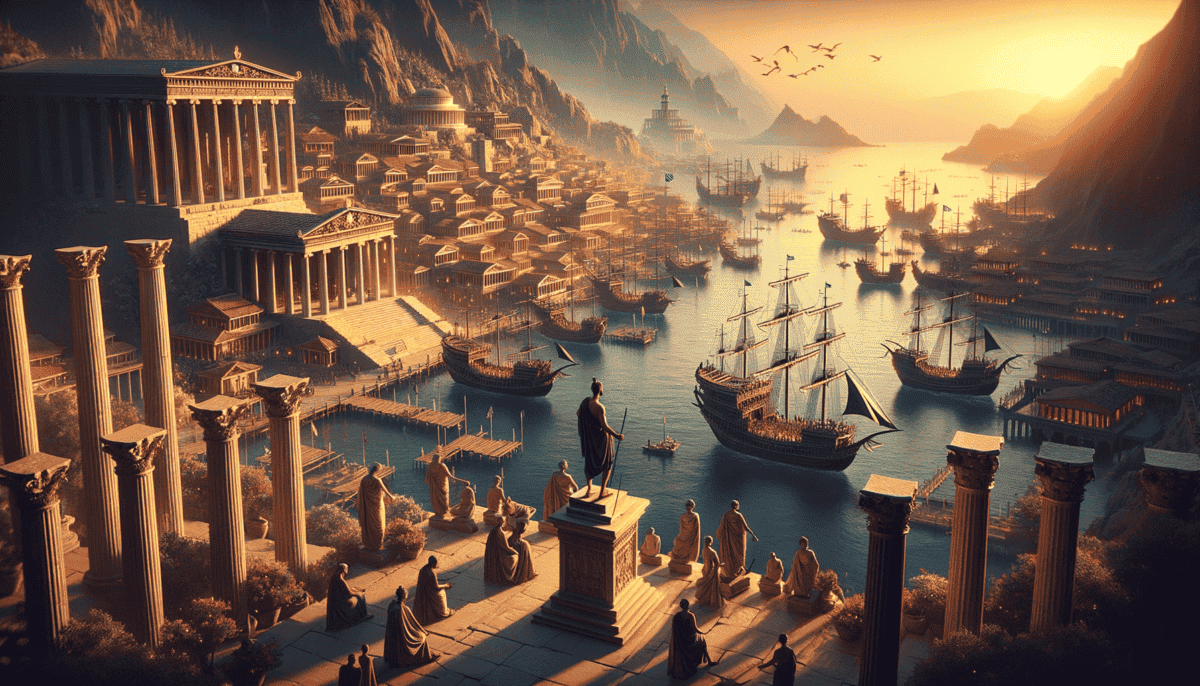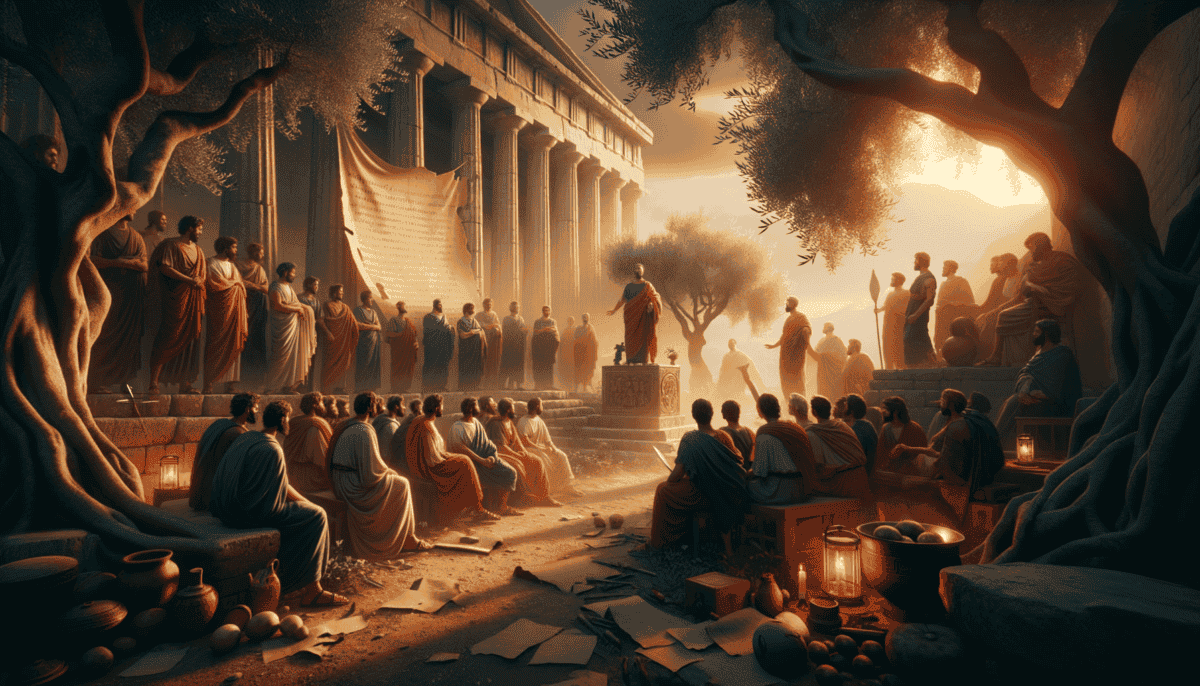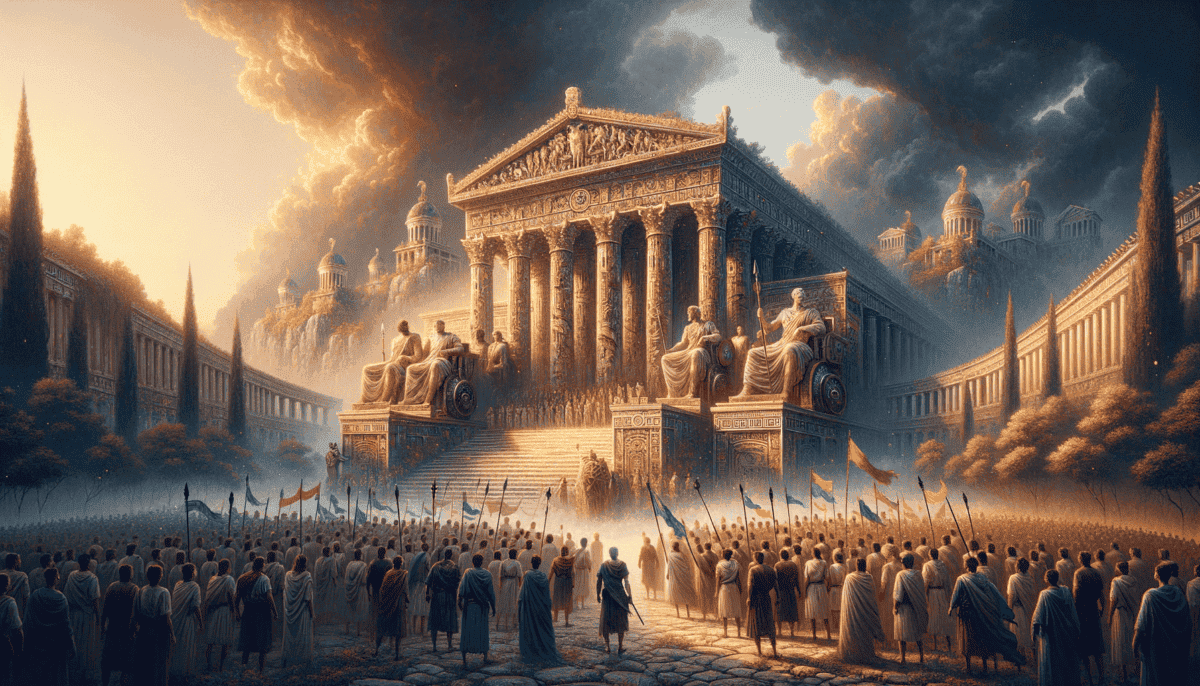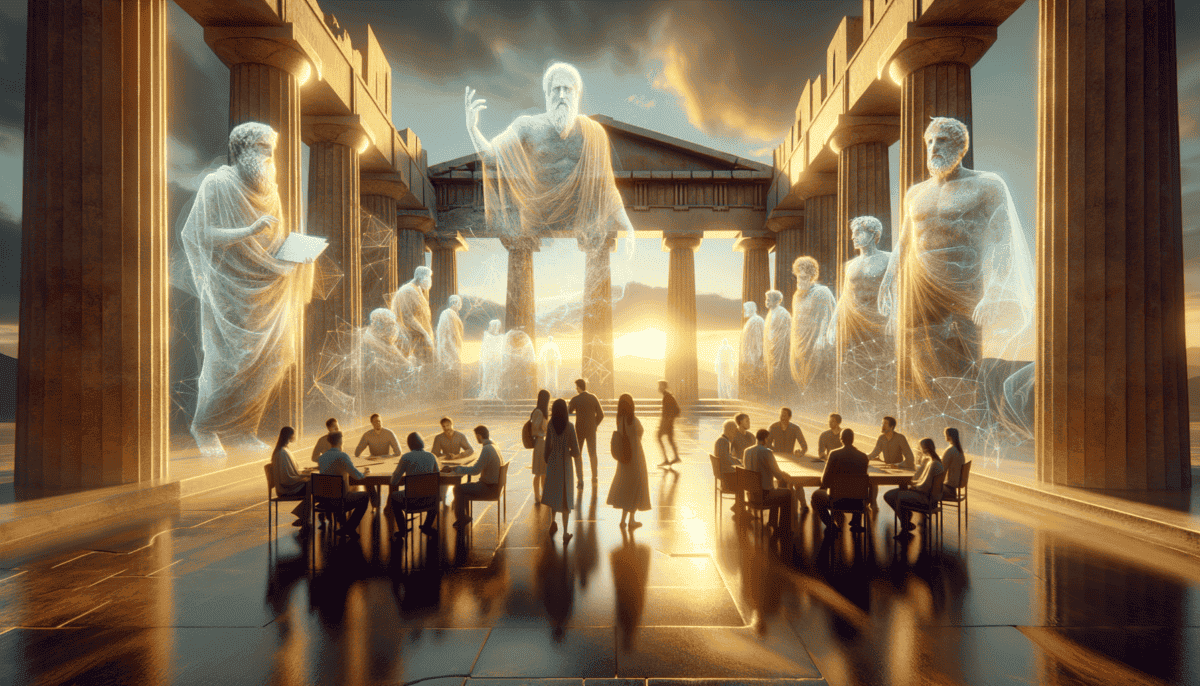Seeds of Power
Long ago, in a land called Greece, the people lived in special cities called city-states. Each city was like its own tiny country! ️ But not everyone was happy. Some people had lots of money and nice houses, while others had very little.
“Why do they get everything while we work so hard?” asked a poor farmer named Demos, wiping sweat from his brow. He looked at the big houses on the hill where the rich people lived.
Life was hard for regular people in ancient Greece. They worked in farms and small shops, but the wealthy nobles made all the rules. The nobles owned the best land and controlled the government. This made many people angry.
A Time of Big Changes
Things started to change when more people learned to read and write. Merchants began traveling to far places to trade goods. Some became rich, but they still couldn't be part of the government because they weren't nobles.
In the busy marketplace, people would gather to talk about their problems:
"Our children are hungry!" said one woman.
"The nobles take too much of our crops!" complained a farmer.
"We need someone to stand up for us!" shouted a merchant.
These problems made people look for new leaders. They wanted someone strong who would help them fight against the nobles. This is how the first tyrants came to power.
The First Steps to Power
One day, a man named Cypselus stood up in Corinth. He was different from other leaders. He talked to regular people and promised to help them. Many liked him because he came from a family that wasn't noble, just like them.
"I will make things fair!" Cypselus promised. "Together, we can build a better city!"
People began to trust leaders like Cypselus. These new leaders were:
• Smart and good at talking to people
• Brave in fighting
• Kind to poor people
• Good at making plans
• Strong enough to stand up to nobles
1. Support from regular people
2. Help from soldiers
3. A plan to make the city better
Some cities changed quickly when these new leaders took charge. They built:
- New roads ️
- Big temples ⛪
- Better wells for water
- Strong walls around the city
Growing Dreams of Power
As more cities got new leaders, exciting things started happening. Artists made beautiful statues. Writers wrote amazing stories. Farmers got to keep more of their food. But not everyone was happy about these changes.
The nobles would whisper in their big houses: "These new leaders are breaking all our old rules!" But the regular people cheered in the streets: "Finally, someone listens to us!"
Young people dreamed of becoming powerful leaders too. They watched and learned how to:
- Make friends with lots of people
- Learn to fight well
- Help others in need
- Speak in ways that made people listen
The stage was set for big changes in Greece. New leaders were rising, and the old way of doing things was changing forever. The time of the tyrants had begun, and nobody knew what would happen next.
Through the busy streets and quiet farms of Greece, people waited to see what these new leaders would do. Would they make life better for everyone? Or would power change them into something else? The answer would change Greece forever.
The Rise of Pisistratus
In Athens, a clever man named Pisistratus watched and learned from other leaders. He was different from most people who wanted power. Instead of fighting, he liked to make friends!
“To win people’s hearts,” Pisistratus would say, “you must first understand their troubles.”
A Trick to Win Power
One day, Pisistratus came up with a super clever plan. He hurt himself on purpose and went to the marketplace covered in fake cuts!
“Look!” he cried. “The nobles tried to hurt me because I want to help you!”
With his new guards, Pisistratus took over Athens. But he didn’t do it like other leaders who were mean. He was nice to everyone, even the people who didn’t like him!
Making Athens Better
As the new leader, Pisistratus did many good things for Athens:
- Built pretty fountains
- Made new roads ️
- Helped poor farmers
- Started fun festivals
Poor farmers were very happy because Pisistratus gave them:
• Money to buy tools
• Help when times were hard
A Smart Way to Rule
Pisistratus knew that happy people don’t fight against their leader. So he made sure everyone had enough food and work. He even let his enemies stay in Athens if they promised to be nice!
“A city grows strong when all its people work together,” Pisistratus would tell everyone.
Art and Stories
One of the best things Pisistratus did was make Athens beautiful. He loved stories and art!
He built:
• Places for poets to tell stories
• New places to have parties for the gods
Problems and Solutions
Sometimes, rich people tried to cause trouble. They didn’t like that Pisistratus helped poor people. But Pisistratus was too smart for them!
When someone complained, he would say: “Come, let’s talk about it. Maybe we can find a way to help everyone!”
A Happy City
Under Pisistratus, Athens became a very special place. People from all over Greece came to see:
• Amazing art
• Fun festivals
• Happy people
Even though he took power by tricking people, Pisistratus turned out to be a good leader. He showed that sometimes a tyrant could make things better for everyone, not just the rich people.
People still tell stories about the clever tyrant who made Athens great without being mean. His story teaches us that being smart is sometimes better than being strong.
Polycrates and the Island Paradise
Far away on a beautiful island called Samos, there lived a clever man named Polycrates. He loved the sea and wanted to make his island the most powerful place in all of Greece! ️
“Our ships will sail to every corner of the world,” Polycrates would dream. “And everyone will know about our amazing island!”
The Island King
Polycrates became the leader of Samos in a very simple way. He and his brothers told everyone they would make the island better. The people said yes! But then Polycrates did something not very nice – he told his brothers to go away so he could be the only leader.
Making Samos Special
Polycrates wanted Samos to be the prettiest island ever. He built amazing things:
- A huge tunnel through a mountain ️
- Big walls to protect the city
- A beautiful harbor for ships
- Pretty gardens everywhere
The tunnel was super special! Workers dug through a whole mountain to bring fresh water to the city. It was like making a long straw through rock!
Pirates and Treasures
Polycrates had a funny way of getting rich. He let pirates use his harbor, but they had to share their treasure with him!
Artists and Smart People
Just like Pisistratus in Athens, Polycrates loved pretty things and smart ideas. He invited the best artists and thinkers to live on Samos:
• Artists who made pretty statues
• Smart people who solved big problems
The Magic Ring
There’s a funny story about Polycrates and his favorite ring. He loved it so much that his friend said, “You’re too lucky! Throw something you love into the sea!”
So Polycrates threw his ring into the ocean. But guess what? The next day, a fisher caught a big fish – and inside was the ring!
“Even the fish know I should be happy!” laughed Polycrates.
Living in Paradise
Life on Samos was like being on vacation every day:
• Ships brought cool things from far away
• Everyone enjoyed music and parties
• The city was clean and pretty
Polycrates made his island so nice that people called it “Paradise on Earth.” Even though he wasn’t always nice to get power, he made life better for everyone who lived there.
Many people sailing by would stop to see the amazing things on Samos. They would tell stories about the island king who turned his home into the most wonderful place in all of Greece.
The People Fight Back
Things were changing in Greece. People were getting tired of tyrants telling them what to do. They wanted to make their own choices!
Secret Meetings
In dark corners of Athens, people would whisper about freedom. They met in olive groves and quiet homes to talk about making things better.
“We should all have a say in how our city works,” said Theron, a brave potter. “Not just one person!”
The Brave Citizens
Some people started standing up to the tyrants. They weren’t scared anymore! A group called “The Friends of Freedom” began teaching others about sharing power.
New Ideas Grow
Smart people called philosophers started asking big questions:
- Why should one person have all the power?
- Shouldn’t everyone help make rules?
- How can we make things fair for all? ⚖️
- What makes a good leader?
The Big Changes
Cities started trying new ways to run things. Instead of one boss, they had groups of people make decisions together.
Clever Plans
People found smart ways to fight back without swords:
• They wrote funny songs about tyrants
• They shared ideas at big meetings ️
• They helped each other instead of the tyrants
The First Votes
Some cities tried something new – voting! People would use small pieces of clay to say “yes” or “no” to big choices.
“This is amazing!” said old Dimos. “My vote counts just as much as a rich person’s!”
Young Heroes
Young people got excited about these new ideas. They started clubs to learn about running cities fairly.
Hope Grows
More and more people joined the fight for freedom. They realized that working together made them stronger than any tyrant.
Even some rich people started helping. They saw that a city where everyone was happy was better than a city where only a few people had power.
The tyrants were getting worried. They could feel their power slipping away like sand through their fingers. A big change was coming to Greece – and nothing could stop it!
Power Slips Away
The tyrants were scared! All across Greece, their power was getting weaker. People wanted to be free!
Angry Leaders
The tyrants tried to be meaner to stop people from fighting back. But this just made everyone more upset!
“The harder they squeeze, the more people slip through their fingers,” said wise old Sophia. “Like trying to hold water in your hands!”
Cities Rise Up
One by one, cities started to push their tyrants out. It was like a big wave of freedom!
Smart Leaders Step Up
New leaders came forward. But these were different – they wanted to help everyone, not just themselves!
A man named Cleisthenes in Athens had a great idea. He said, “Let’s split the power between lots of people, not just one!”
Working Together
Cities started trying new ways to make decisions:
• Groups of helpers instead of one boss
• Fair courts where everyone followed the same rules ⚖️
• Written laws that everyone could see
The Last Stand
Some tyrants tried to fight back one last time. They called their friends in other cities for help.
“But the people are stronger now,” said young Andreas. “We know how to work together!”
Big Changes
Things were different now. People felt proud and strong! They learned new things:
Happy Cities
The cities that kicked out their tyrants started doing really well! They built beautiful buildings and had lots of fun festivals.
Artists made pretty things. Writers wrote amazing stories. Farmers grew more food. Everyone worked hard because they were working for themselves, not a mean tyrant!
Looking Forward
Young Greeks were so excited about the future. They could be anything they wanted!
A New Day
The sun was setting on the time of tyrants. A new day was coming – one where people would work together to make their cities amazing!
The waves still crashed on Greece’s shores, but now they sang a song of freedom. The olive trees still grew tall, but now they gave shade to people making their own choices.
The Power of the People
The sun rose on a new Greece. The age of tyrants was over! People walked with their heads held high.
A Free Land
Little Maria skipped through the marketplace. “Grandpa, tell me about the old days with the tyrants again!”
“Those days taught us something very important,” Grandpa smiled. “Power belongs to everyone, not just one person.”
The Big Changes
Greece was different now. Every city had special ways to make sure no one could become a tyrant again:
• Leaders took turns being in charge
• Everyone followed the same rules
• Courts were fair to all people ⚖️
Happy Cities
The cities grew beautiful and strong. Without tyrants, people worked together better! ️
Smart Ideas Grow
Teachers and thinkers could share their ideas freely now. Schools opened where kids learned about math, art, and how to be good citizens.
“When everyone can think and speak freely, we all get smarter!” said the wise teacher Sophia.
Looking Back to Learn
Greeks wrote down the stories of the tyrants. They wanted everyone to remember the lessons they learned:
A Better Way
The new way of ruling – called democracy – spread to other places. Many people liked the idea of everyone having a say!
Even today, thousands of years later, people remember what the Greeks learned about sharing power and being fair.
The Best Gift
The greatest thing the tyrants left behind wasn’t the buildings they built or the wars they won. It was teaching people a better way to live together!
Forever Free
As the stars twinkled over Greece, people gathered to tell stories and make plans for tomorrow. They were free to dream, free to speak, and free to make their own choices.
“And that’s why,” Grandpa told Maria, “we must always remember to protect our freedom and share our power. It’s the greatest treasure we have!”


